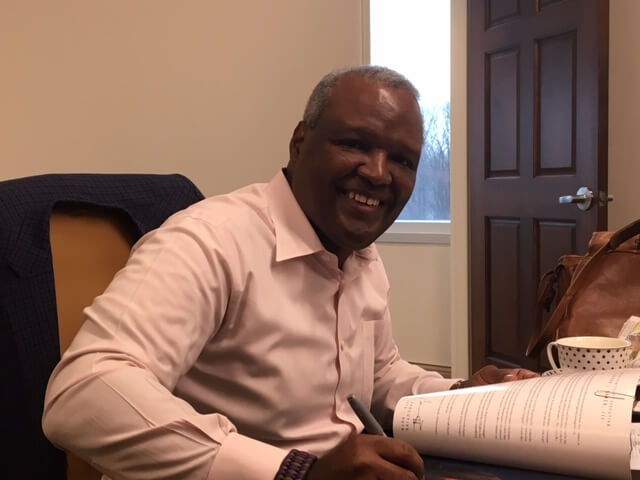The Education of Rushern Baker

Prince George’s County Executive Rushern L. Baker III (D) leaves office Monday, after eight years on the job. Angela D. Alsobrooks (D) takes the oath of office to replace him on Dec. 3 at noon.
In a conversation with Maryland Matters reporter Bruce DePuyt this week, Baker talked with unusual candor about his tenure, his accomplishments, a fear that he was in over his head, and a public panic attack that he fretted would create public doubt about his readiness for the job.
Baker reflected on the challenge of taking office in the aftermath of the scandals that engulfed his predecessor, former County Executive Jack B. Johnson (D), who was sentenced to prison for accepting bribes.
In Part I of the interview, Baker lavished praised on the key aides and high-profile mentors who helped him navigate various challenges. And he discussed how he tackled self-doubt about his ability to govern a county of nearly 1 million people.
This Q&A has been lightly edited for length and clarity.
First of two parts.
Maryland Matters: You leave office in just a few days, after eight years as county executive. What thoughts do you have?
Rushern Baker: I came in on Sunday to pick up some of my boxes. I’m driving myself. That’s the first thing I noticed. I haven’t done that in eight years.
I was coming from National Harbor, so I drove past MGM, Dave & Busters. And I thought about all the work that’s been done over eight years and how quickly the eight years got here and how tough it was.
But then I’ll see something, like on Kenilworth Avenue in Riverdale, that I think, ‘Wow, I really should do something about the revitalization of this area,’ and it dawns on you that, ‘no, that’s not your problem. Or your opportunity.’ So it’s bittersweet.
It’s time. Eight years is a long time. And I’m thankful for all the hard work and all the things that we’ve done.
Our crime rate now — any homicide is too many — but we’re at 51 [for the year]. We had a 30 percent reduction over last year. We’re probably going to end the year with under 80 homicides. That hasn’t been done in decades. That’s going to be the lowest number of the eight years I’ve been here. And overall crime is down. No one would have thought [we could do that] eight years ago.
It’s hard to leave when you’ve figured it out and you know what you’re doing, you know how to exercise the levers of government to make it work for people.
MM: When did you first have that feeling?
Baker: A year into it. [Montgomery County Executive] Ike Leggett and [former Montgomery Executive] Doug Duncan and [former Prince Goerge’s Executive] Wayne Curry all said to me, ‘It’s going to take you six months to figure out and to just get comfortable with the job,’ and I didn’t believe them. I really didn’t. I thought I came in with a wealth of experience from having been in the legislature and head of a small non-profit. Plus I’d run for county executive three times, and I’d thought long and hard about what I wanted to do.
But they were correct. About six months in I became comfortable being county executive; about a year in I knew how to be county executive. And there’s a difference.
MM: What were your expectations for your agency heads and what were the warning signs that they weren’t up to the job?
Baker: [Laughs] I thought long and hard about the senior people in the cabinet. We started with the deputy county administrators and what I was looking for from them. Because my notion was, ‘I can’t manage a whole government.’ There are 6,000 employees in the county and 16,000 in the school system. I knew I only wanted to manage five people.
So we looked long and hard for department heads who were innovative but also had knowledge of government, because that’s what I lacked. Particularly coming after the fiasco of the previous administration. It was very important that I got people that The Washington Post and media and other folks would instantly say, ‘OK, those folks have credibility.’
So every position on the fifth floor was made up of acting deputy CAOs who had worked in the Glendening administration or the Curry administration, and they were coming back from the private sector to help me stabilize government, and that allowed me to choose permanent staff.
Probably the single best decision I made was to bring in Wayne Curry’s chief of staff, Glenda Wilson. I wanted her to come in and advise me, because I knew enough to know I didn’t know anything — and I knew she could help me think through problems.
I convinced her to come in for a six-month tour of duty with me until I got my feet wet, and a month into it I figured out I was in over my head, and I needed somebody with experience on how to run government, both the policy and the politics. And convincing her to be the chief of staff was probably the single most important decision I made.
MM: Is her skill set under-appreciated?
Baker: Oh, God. So totally under-appreciated, by everybody. I don’t know I appreciated how much I was going to need her.
MM: Who else did you turn to?
Baker: I had some of the best people. I talked to [former county executive and Gov.] Parris Glendening. I talked to Wayne Curry. Doug Duncan. Ike Leggett tutored me for literally a month. I would go over there and ask him every question under the sun.
Once you sit in this seat and you see that the problems really are complex, and they’re every day. And they’re things you would never think of. The problems that arise are not the ones that you think about. It could be some agency you’ve never heard of. And the thing about having a really good chief of staff is they know government, but they also know the politics. Because when you come in and you’re new, you have all these ideas, and you instantly want them to happen, and that’s when you realize you’ve been elected county executive and not emperor or king.
You have to deal with both the county council and the state legislature, because the things you want to happen most require some part of legislation. Probably the best example is the economic development incentive fund.
We came in shortly after the recession. The real estate [downturn] hit Prince George’s County after everybody else. And once it hit, it hit bad, because we were leading the nation in foreclosures.
And businesses weren’t coming here for fear of corruption and bribes, so we didn’t have a commercial tax base. We had a $75 million budget deficit that I inherited. I had no clue that would happen. The legislature had just passed legislation passing the cost of teacher pensions down to the localities, which we weren’t prepared for.
My notion to turn this around was to bet on ourselves, to do something to get people to say, ‘Wow, there’s opportunity there.’ So we came up with the brilliant notion of a business incentive fund. Other counties were doing $10 million. The state was doing $70 million.
But I wanted to be bold. I wanted to make a statement. And I think it was [county economic director] David Iannucci who said, ‘$20 million would be good, but $50 million…’
I said, ‘Well, if we did $50 million…’
He said, ‘You can’t do $50 million, you’ve got a recession.’
I said, ‘If we did it, what would happen?’
He said, ‘That would be wow.’
And I said, ‘That’s what I want.’
The reason I bring it up is, I thought it was the most brilliant idea that these individuals came up with. It wasn’t me, it was the team. And then reality set in. I didn’t have the authority to set aside $50 million to spend as an incentive to get businesses to come here. I need legislation. And Wayne Curry said to me, ‘You have to go convince the Council.’ And that’s when Glenda Wilson said, ‘Here’s how you have to lay the groundwork, this is not going to be as easy as you thought.’
And I went before the Council and they said, ‘You’re nuts.’ [Laughs.] They literally said, ‘You’re crazy.’
Here’s why. The first act I had to do as county executive was to repeal a 2 percent pay raise that the previous administration had given all employees when we didn’t have the money. And as soon as I convinced them we had to do that, the next thing I wanted to do is take $50 million and give it to the fat cats, as they saw it.
I was mad [the Council wouldn’t go along], and I said, ‘I’m just going to do it.’ And she said, ‘You can’t. You don’t have the authority.’
And I was like, ‘Oh.’
And then it was a process of ‘here’s how it’s done.’ You’re not campaigning any more. It’s not a speech. So the mechanics of government are slow, they’re deliberate, they’re frustrating. It took us a year to implement the economic development incentive plan, which now, if you talk to council members, they love it.
We have $8 billion worth of development going on. We’ve got big projects in Largo and New Carrollton and Suitland. But it was a year. Nobody remembers the opposition.
MM: What was it like to realize you were ‘over your head?’
Baker: You realized you’re over head the day you take your hand off the Bible. Everybody has their way of dealing with the panic attack. Most people’s panic attack was not as public as mine was. Mine — and most people, including you, were very nice to me, and I think felt sorry for me — but my first press conference on the budget, I froze. In mid-sentence. I remember as if it was yesterday.
Mike Errico, who was our acting CAO, and Tom Himler, who was the budget director at the time, and [senior officials] Doug Brown and Brad Seamon came in, and they said, ‘here’s the budget, and it’s bad.’
And that’s when they told me about the $75 million budget deficit. And they wanted to prep me. And I said, ‘I’ve been giving speeches my whole life. I don’t really need prep.’ I’m going to read the numbers; it’ll be fine. Just write ‘em out and I’ll read ‘em.
And I got to the press conference and for the first time, as I was reading the numbers, it hit me that, ‘Oh, my God, all the lights were on me, all the cameras were on me. It was just me.
It wasn’t like being the leader of the Prince George’s House delegation, where there are 21 people behind you.
For the first time, there’s no budget director with you. It’s you. And you realize everybody is looking at you to solve their problems. And at that moment, I just froze. I couldn’t speak. It seemed like 20 minutes, but it was probably was one or two.
MM: Or it might have just been a few seconds.
Baker: What happened was, at that moment, just the weight of the world. And it snowballed from there, because after I did that, then I was supposed to go on a break for Christmas and we had a major snowstorm. Wall Street, because of the federal indictments, got nervous and gave us just 30 days, instead of the usual 60, to meet with the rating agencies, because they were thinking about down-grading us, because federal dollars had been stolen — and they needed to meet with me and my team, which they were concerned about.
So, within 30 days, I’ve got a deficit, a federal investigation that’s on-going. The FBI was still here, still serving subpoenas, still investigating. They were actively prosecuting a Council member (Jack Johnson’s wife, Leslie). And then I get a snowstorm and then before I could go to Wall Street we have a string of homicides.
I was fortunate I could talk to Wayne, and on the budget I called Ike. I said, ‘I don’t know anything about Wall Street. I’m nervous. Can you help?’And he said, ‘sure.’
He said, ‘Listen, they want to test and see if you’re the right person, what you’re mettle is, whether you can handle the problems. And just assume they know everything.’ They read the papers, they know all the reports.
So he said he went up there and presented the entire budget himself. I didn’t know every agency. I didn’t know every part of the budget. I had just gotten here. So [laughing] I said, ‘OK, what’s the second-best thing?’
So I crammed like it was a law school exam. He told me to treat it that way. He said, ‘Just pretend it’s like that class I made you take in law school.’
And that’s what I did. I spent a week prepping with the team. I couldn’t sleep. I couldn’t eat. I was on the train. It’s like cramming for the bar exam. You’re just not sure you’re ready.
And then you go up there and present it, and they’re like the Iron Bank in Game of Thrones. They sit there and they don’t say anything! They didn’t say a word in any of the three presentations. They just sat there and they listened and they asked a question or two. And then, it was over.
And I asked my staff, ‘what the heck just happened?’
And that’s when Tom Himler said, ‘Either they’ll downgrade us or they won’t.’




 Creative Commons Attribution
Creative Commons Attribution